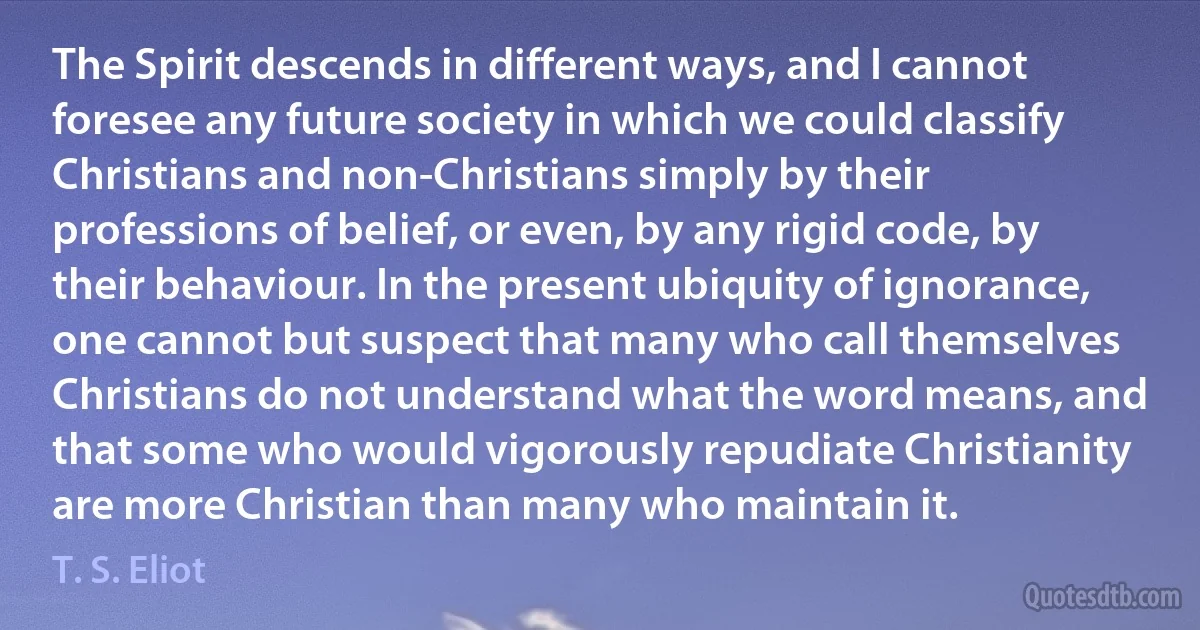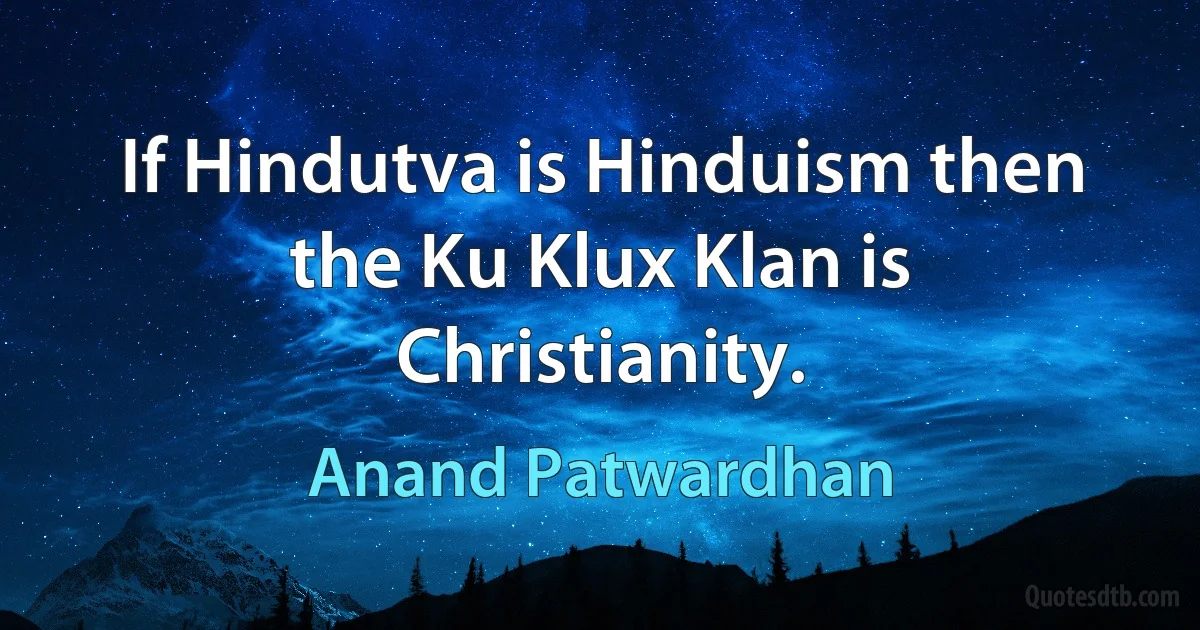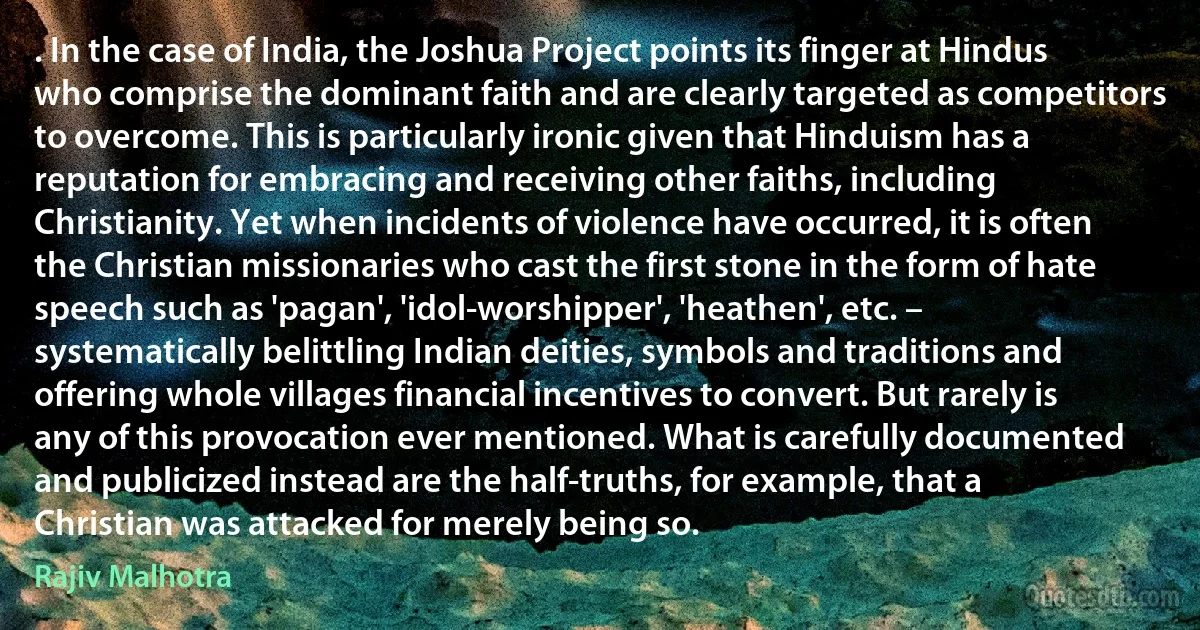Christianity Quotes - page 46
It is only natural that I should constantly have revolved in my mind the question of the relationship of the symbolism of the unconscious to Christianity as well as to other religions. Not only do I leave the door open for the Christian message, but I consider it of central importance for Western man. It needs, however, to be seen in a new light, in accordance with the changes wrought by the contemporary spirit.

Carl Jung
I do not look upon the French Revolution as a question subject to the ordinary calculation of politics; it is a thing which is to be; and, as all human experience has verified that the new doctrine ever finally subverts the old, as the Mosaic law subverted idolatry, as Christianity subverted the Jewish dispensation, as the Reformation subverted popery, so, I am firmly convinced, the doctrine of republicanism will finally subvert that of monarchy and establish a system of just and rational liberty on the ruins of the thrones of the despots of Europe.

Theobald Wolfe Tone
The generous wish to share with all what is precious, to spread broadcast priceless truths, to shut out none from the illumination of true knowledge, has resulted in a zeal without discretion that has vulgarised Christianity, and has presented its teachings in a form that often repels the heart and alienates the intellect. The command to "preach the gospel to every creature” – though admittedly by doubtful authenticity – has been interpreted as forbidding the teaching of Gnosis to a few, and has apparently erased the less popular saying of the same Great Teacher "Give not that is holy unto the dogs, neither cast ye your pearls before swine.”.

Annie Besant
In literature and in art, alike, this gloomy fashion of regarding Death has been characteristic of Christianity. Death has been painted as a skeleton grasping a scythe, a grinning skull, a threatening figure with terrible face and uplifted dart, a bony scarecrow shaking an hourglass – all that could alarm and repel has been gathered round this rightly-named King of Terrors. Milton, who has done so much with his stately rhythm to mould the popular conceptions of modern Christianity, has used all the sinewy strength of his magnificent diction to surround with horror the figure of Death.

Annie Besant
Many, perhaps most, who see the title of this book will at once traverse it, and will deny that there is anything valuable which can be rightly described as "Esoteric Christianity." There is a wide-spread, and withal a popular, idea that there is no such thing as an occult teaching in connection with Christianity, and that "The Mysteries," whether Lesser or Greater, were a purely Pagan institution. The very name of "The Mysteries of Jesus," so familiar in the ears of the Christians of the first centuries, would come with a shock of surprise on those of their modern successors, and, if spoken as denoting a special and definite institution in the Early Church, would cause a smile of incredulity.

Annie Besant
We have already spoken, in the first chapter, on the identities existing in all the religions of the world, and we have seen that out of a study of these identities in beliefs, symbolisms, rites, ceremonies, histories, and commemorative festivals, has arisen a modern school which relates the whole of these to a common source in human ignorance, and in a primitive explanation of natural phenomena. From these identities have been drawn weapons for the stabbing of each religion in turn, and the most effective attacks on Christianity and on the historical existence of its Founder have been armed from this source.

Annie Besant
Men fear that Christianity will be weakened when reason studies it, and that it is "dangerous" to admit that events thought to be historical have the deeper significance of the mythical or mystical meaning. It is, on the contrary, strengthened, and the student finds, with joy, that the pearl of great price shines with a purer, clearer lustre when the coating of ignorance is removed and its many colours are seen.

Annie Besant
It is patent to every student of the closing forty years of the last century, that crowds of thoughtful and moral people have slipped away from the churches, because the teachings they received there outraged their intelligence and shocked their moral sense. It is idle to pretend that the widespread agnosticism of this period had its root either in lack of morality or in deliberate crookedness of mind. Everyone who carefully studies the phenomena presented will admit that men of strong intellect have been driven out of Christianity by the crudity of the religious ideas set before them, the contradictions in the authoritative teachings, the views as to God, man, and the universe that no trained intelligence could possibly admit.

Annie Besant
Max Beer, in his History of British Socialism, points out that Bacon looked for the happiness of mankind chiefly in the application of science and industry. But by now it is plain that if this alone were sufficient, we could all live in heaven tomorrow. Beer points out that More, on the other hand, looked to social reform and religious ethics to transform society; and it is equally plain that if the souls of men could be transformed without altering their material and institutional activities, Christianity, Mohammedanism, and Buddhism might have created an earthly paradise almost any time this last two thousand years. The truth is, as Beer sees, that these two conceptions are still at war with each other: idealism and science continue to function in separate compartments; and yet "the happiness of man on earth" depends upon their combination.

Lewis Mumford
Christian anarchism does share a lot with Christian pacifism, but it goes further, especially by carrying this pacifism forward as implying a critique of the violent state. Christian anarchism also shares a lot with liberation theology especially its insistence that Christianity does have very real political implications. But Christian anarchism is critical of liberation theology's emphasis on human agency, of its compromise with violence, and its lack of New Testament references compared to Christian anarchism. In short, while related to at least two important trends within Christian political thinking, Christian anarchism is more radical than both, and thus provides a unique contribution to Christian political thought. ... It is a unique political theology, and a unique political theory.

Alexandre Christoyannopoulos
When Christianity becomes conscious of its innermost nature, it realizes that it is godliness rising our of inward constraint. The highest knowledge is to know that we are surrounded by mystery. Neither knowledge nor hope for the future can be the pivot of our life or determine its direction. It is intended to be solely determined by our allowing ourselves to be gripped by the ethical God, who reveals Himself in us, and by our yielding our will to His.

Albert Schweitzer
Thus we may infer that the only characteristic difference between modern Christianity and the old heathen faiths is the belief of the former in a personal devil and in hell. "The Aryan nations had no devil," says Max Muller. "Pluto, though of a sombre character, was a very respectable personage; and Loki (the Scandinavian), though a mischievous person, was not a fiend. The German Goddess, Hell, too, like Proserpine, had once seen better days. Thus, when the Germans were indoctrinated with the idea of a real devil, the Semitic Seth, Satan or Diabolus, they treated him in the most good-humored way."

Max Müller
No religion as such produces the New Being. Circumcision is a religious rite, observed by the Jews; sacrifices are religious rites, observed by the pagans; baptism is a religious rite, observed by the Christians.
All these rites do not matter - only a New Creation. And since these rites stand, in the words of Paul, for the whole religion to which they belong, we can say: No religion matters - only a new state of things. Let us think about this striking assertion of Paul. What it says first is that Christianity is more than a religion; it is the message of a New Creation.

Paul Tillich
In the upper, rich, more educated classes of European society doubt arose as to the truth of that understanding of life which was expressed by Church Christianity. When, after the Crusades and the maximum development of papal power and its abuses, people of the rich classes became acquainted with the wisdom of the classics and saw, on the one hand, the reasonable lucidity of the teachings of the ancient sages, and on the other hand, the incompatibility of the Church doctrine with the teaching of Christ, they found it impossible to continue to believe the Church teaching.

Leo Tolstoy
Any form of orthodoxy is just not part of a poet's province ... A poet must be able to claim ... freedom to follow the vision of poetry, the imaginative vision of poetry ... And in any case, poetry is religion, religion is poetry. The message of the New Testament is poetry. Christ was a poet, the New Testament is metaphor, the Resurrection is a metaphor; and I feel perfectly within my rights in approaching my whole vocation as priest and preacher as one who is to present poetry; and when I preach poetry I am preaching Christianity, and when one discusses Christianity one is discussing poetry in its imaginative aspects. ... My work as a poet has to deal with the presentation of imaginative truth.

R. S. Thomas
True Christianity at its most profound is as good as you get. ... I think I've been lucky in the period which I've lived through because obviously I would have been for the chop in earlier days. The Inquisition would have rooted me out; even in the 19th century I would probably have been had up by a Bishop and asked to change my views, or to keep them to myself etc.... I think that so much of our Christian beliefs ... are an attempt to convey through language something which is unsayable.

R. S. Thomas
In Hindu marriages, for instance, unlike the nuptials of Christianity, the priest does not perform the rituals, nor does he have the authority to declare the couple married; he acts only as the coach. The groom and bride themselves perform the ceremony. In other words, there is no external authority declaring them man and wife. The same do-it-yourself freedom is evident in other pursuits, such as yoga and meditation. Even in formal worship, the guidelines are meant for beginners, and these give way to increasing freedom as the individual becomes self-propelled in the spiritual journey without need for external authority.

Rajiv Malhotra
We are told that Christ was killed for us, that His death has washed out our sins, and that by dying He has disabled death itself. That is the formula. That is Christianity. That is what has to be believed. Any theories we build up as to how Christ's death did all this are, in my view, quite secondary: mere plans or diagrams to be left alone if they do not help us, and, if they do help us, not to be confused with the thing itself.

C. S. Lewis
Moses has four wives, and so did Abraham ... To this day, Judaism permits polygamy. The Hindus permit polygamy. The Buddhists permit polygamy. There is not a single religion on the face of the earth that bans polygamy, but all religions agree that women are not allowed to have more than one husband. Christianity is the only religion that does not permit more than one wife. The rest - six billion people on Earth – permit polygamy.

Ali Gomaa



